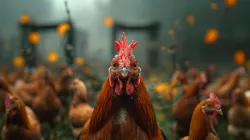Bird flu death: Here's what you need to know about H5N1 virus
CDC reported the death of a person due to the H5N1 bird flu virus. Bird flu spreads from animals and birds to humans. The infection infects your upper respiratory tract and lungs. Read on to know more about the virus.

The Centers for Disease Control and Prevention (CDC) reported that a person has died of H5N1 bird flu in the United States. The person was previously hospitalized with severe avian influenza A(H5N1) illness (H5N1 bird flu). This is the first person who died of H5N1 infection in the US. The case was related to animal-to-human exposure.
Bird flu infection doesn't spread from one person to the other and it spreads from animals and birds to humans. This is also known as a dead-end infection because there isn't any transmission from one human to the other.
H5N1 was first identified in Southern China in 1996 and it has caused sporadic outbreaks in wild and farmed birds around the globe over the years. According to a report in CNN, scientists said that virus would need to evolve or retain key changes in its genetic sequence to start a pandemic.
H5N1 bird flu is an infection that spreads in birds and other animals. However, it can also infect humans. The infection infects your upper respiratory tract and lungs. It can also spread to other parts of the body. In recent cases, the infection also affected the eyes, thereby, causing pink eye.
Symptoms of bird flu
- Pink eye (conjunctivitis)
- Fever
- Fatigue
- Cough
- Muscle aches
- Sore throat
- Nausea and vomiting
- Diarrhea
- Stuffy or runny nose
- Shortness of breath (dyspnea).
Complications of bird flu
Some cases of bird flu can become severe, thereby, causing complications. Here are some complications of bird flu.
- Pneumonia
- Acute respiratory distress
- Bacterial infections
- Sepsis
- Brain swelling, like meningoencephalitis
- Respiratory failure.
Prevention of bird flu
Here are some preventive tips for bird flu.
- Wear protective clothing when working with birds, wild animals and livestock
- Wash your hands frequently when handling birds, wild animals and livestock or after being in areas where they live
- Don’t work with animals who are sick or who’ve been exposed to avian influenza
- Take your shoes off before entering your home if you’ve been in areas where birds like waterfowl or chickens live
- Don’t touch or drink unpasteurized milk
- Get a seasonal flu shot.
ALSO READ: Afraid of getting diagnosed with HMPV? Here's how to protect yourself from this respiratory virus